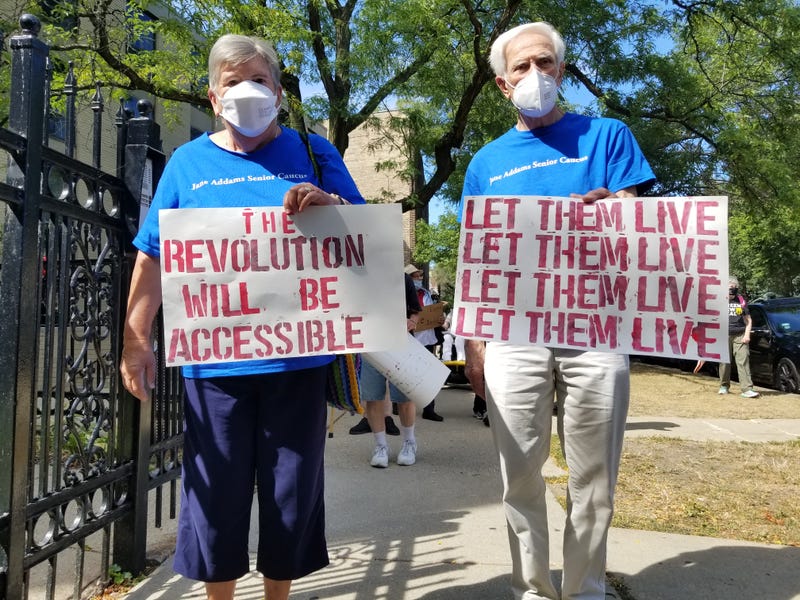
CHICAGO (WBBM NEWSRADIO) -- A march in Rogers Park on Sunday was organized to highlight the experiences of the elderly and disabled on lockdown in long-term care facilities during the COVID-19 crisis and to demand Governor Pritzker take emergency action to relocate residents.
The march, organized by the Institutional Rescue and Recovery Coalition with about two dozen people, made its way through the Rogers Park neighborhood, stopping at six facilities along the way to share and hear stories of those inside or those who have been inside. Many say they feel locked up and that their choice to leave has been taken from them.
“I feel they didn't do enough for us. People are dying of the virus and it's being passed around like a tennis ball,” said Moe Mansur, a resident of Lakefront Nursing. “Nursing homes were not prepared. We need the governor to take action. People are stranded.”
RELATED: Nursing Home Allows COVID-19 Positive Employees | Nearly 26,000 COVID Deaths In Nursing Homes Spur Inspections
In one of the homes, residents were separated from the outside by an iron fence; and, as they shared their stories of overcrowding, improper handling, and even a lack of access to water, they were instructed to return inside by staff over a loud speaker. The residents held their own demonstration and defied orders stating that by speaking out they may lose their privileges, including being able to go outside. They held signs that read 6 months of imprisonment, no answers, even 30 days without water.
At the beginning of the COVID-19 outbreak, Governor Pritzker waived nursing home liabilities in COVID transmission or death. Becky Ozaki, a march organizer, said that may have led to a more relaxed approach to care during the pandemic.
A board member of the Jane Adams Senior Caucus, Carmen Betances, echoed that statement saying the Governor's decision to wave COVID liabilities for facility owners has led to less than ideal conditions for residents.
Advocates report in Rogers Park alone, over 100 nursing facility residents have died and over 700 have been infected by COVID, representing over 50 percent of the infections in the neighborhood.
Facilities like Mosaic and Waterford have seen 11 percent of their residents die, and Birchwood has seen 10 percent die. According to IRRC, residents of one facility, Chalet, have gone without bathing for one month due to a legionnaires outbreak, further increasing the risk of COVID infections and deaths.
A growing national movement is calling on governors to create emergency relocation plans that remove people from congregate settings into less dense housing, such as hotels for temporary refuge, if necessary. IRRC said relocation would save the lives of those rescued and reduce the spread of COVID-19 to residents and workers that remain in those institutions.
Over half of all COVID-19 related deaths in Illinois have taken place in congregate- care settings. According to the Illinois Department of Public Health, as of Aug. 21 there have been 4,319 deaths in long-term care facilities from COVID-19, with a 16.7 percent death rate among infected individuals.
Centers for Independent Living (CILs) in other states have already developed programs for safely relocating persons from these facilities. A Chicago ordinance co-sponsored by Aldermen Taliaferro and Burnett proposes filling 1,250 empty CHA units with residents from congregate care facilities. IRRC supports these initiatives, calls on Governor Pritzker to enact emergency relocations immediately, repeal all liability waivers protecting facility owners and administrators, reopen facilities for access by oversight entities, and publicly document distributions of emergency response resources to facilities.
